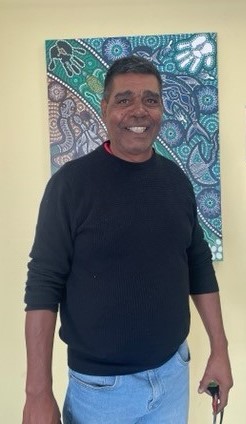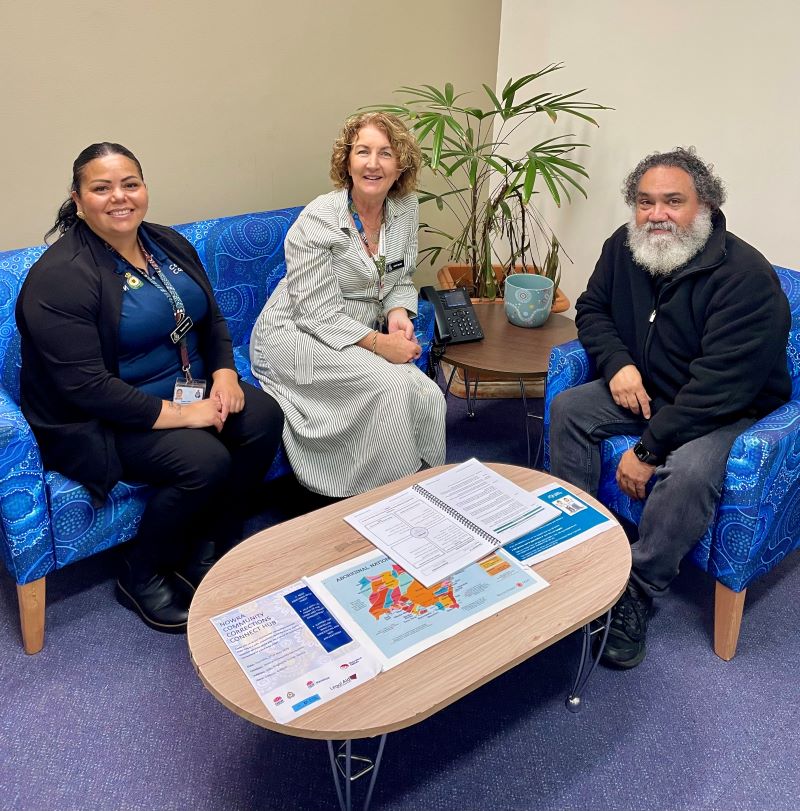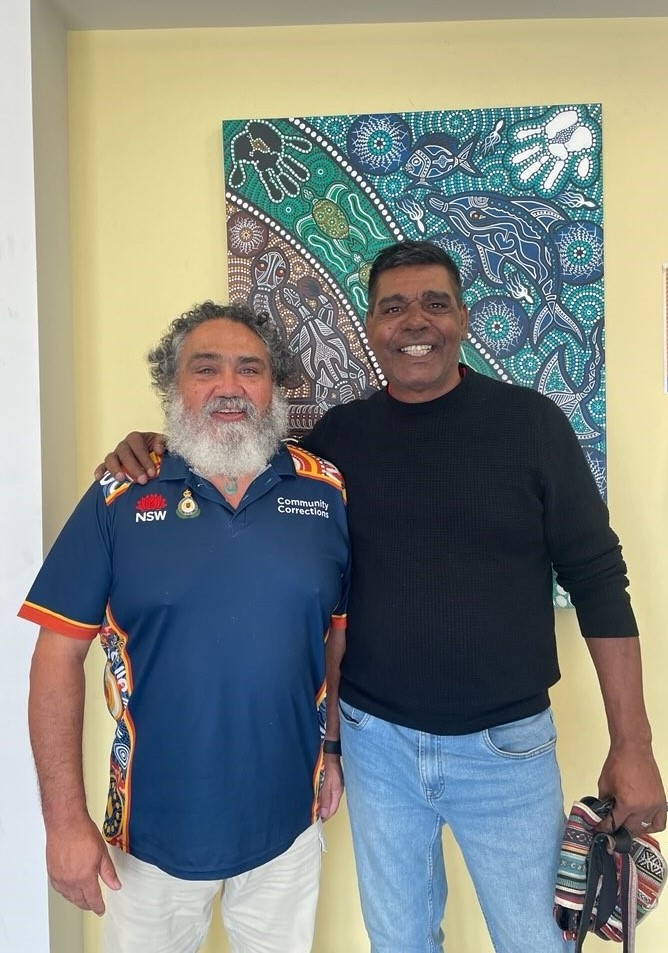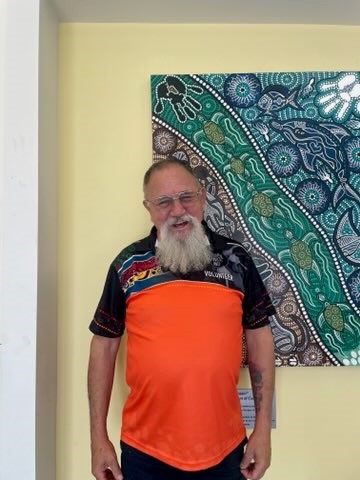Automatic language translation
Our website uses an automatic service to translate our content into different languages. These translations should be used as a guide only. See our Accessibility page for further information.
7 JULY 2025
The Shoalhaven region boasts a rich Aboriginal history, home of the Wandi Wandian people of the Yuin nation for over 40,000 years. Today, however, a significant number of Aboriginal people serve time at the South Coast Correctional Centre. A new framework, Staying on Track, is being piloted by the Nowra Community Corrections Office, collaborating closely with Elders and community. This initiative aims to ensure that these men have a strong support network upon their release and helps break down entrenched barriers between Aboriginal men and Community, to support successful community reintegration and avoid reoffending.

Stan Jarrett was concerned by the rising rates of Aboriginal men reoffending and the lack of cultural support and connection to help prevent this. As an Aboriginal Community Engagement and Culture officer (ACECO), he took his responsibility to rehabilitate and mentor Aboriginal men seriously. This commitment led him to develop the Staying on Track framework, designed to support Aboriginal people prior to their release from custody and continuing for up to six months after release.
“It is so important that we are there from pre-court until release, providing support in the community. I know how hard I found it as a worker when all the services kept changing, so how must it feel for the inmate when they are walking out the door?” says Stan.
“There are options now where they didn’t exist before and support mechanisms. The goal is to keep our Aboriginal people out of custody, so it starts the day after you are sentenced.”
When Stan proposed the idea of a targeted support program for Aboriginal men, he knew it had to be fluid. He wanted a framework that could be moved across regions as needed.
“It’s a living thing, not set in concrete and it can be taken to individual communities and adapt to the needs there,” Stan explains. “The project has a framework that can be followed, but it can also be applied and changed to meet the needs of different locations throughout NSW.”
So far, observational data reflects positive indicators of success, including improved engagement in community based supervision, and a reduction in return to custody arising from supervision non-compliance. This would not have been possible without the strong support from Nowra Community Corrections Office Manager Cathy Bland, Aboriginal Reintegration Officer Jason Sharp, Community Engagement and Culture Officer Tamara Ardler, and the Nowra Community Corrections Aboriginal Reference Group.

Jason connects with Aboriginal men 12 months before their release date. He talks to them about Staying on Track and the steps involved. These steps include family conferencing, connection with Elders and community, engagement with the ACECO, and support services including mental health and employment agencies.

“Once they are identified as eligible, I go and see them, explain the program and that it is voluntary,” explains Jason.
To be eligible, the men must be Aboriginal, housed at South Coast Correctional Centre, and being released to a supervision order. Those being released to the Shoalhaven area are given priority.
“If they want to do it, I get them to sign a consent form and I can start talking to their family - family conferencing is part of the process - but some Aboriginal men don’t want to involve their family and we can work around that. There may be shame, or a total disconnect from family.”
Breaking down the stigma or shame is a big motivator for all involved with Staying on Track, and this is where the connection with Elders is particularly important.
“There is the stigma of being in gaol,” says Stan. “I don’t think community will ever shake that off, local communities have a long memory. So, it’s important that community is involved and the Elders are involved to help them with the sense of shame.”

Uncle Barney was eager to get involved, as were many other Elders in the Shoalhaven area, believing that they have a duty to see their culture survive and to help Aboriginal men address trauma and change their lives.
“I’m here to help them transition without stress and trauma back into the real world,” Barney says. “Our role is to help mend fences that may have been broken with family and community. We can sit and have a yarn, help them absorb culture and sensitivities they may not have been taught growing up, and give support that can help break the cycle.”
While the Elders are mending fences, Jason is building bridges between Aboriginal men on supervision orders and Community Corrections. His role in Staying on Track is to explain everything that will happen upon release, connect them to the corrections staff they will work with, and ensure there is a culturally safe aspect to any order.
“Breaking down mistrust is important, and making sure things are not too confronting upon release. If we can start with the family it helps, ideally this is the first approach and then Elders and community stakeholders, and employment strategies,” he explains. “The goal is to reduce returning to custody and to increase engagement in supervision.”
Jason will hand over to Tamara once the man is released and she helps with the transition from custody to community.
“I tell them it’s going to be hard work, but if you want to do it, I’m going to help you,” she says.
“And I provide the cultural connection, they know they can come and talk to me, I am in the community, that is so important, and we can see it has made a difference.”
Jason has connected with 123 Aboriginal men in a 12-month period since the framework was launched, and preliminary findings are excellent, with a notable decrease in breaches of community corrections orders due to non-compliance with supervision.”
“I’m a big believer in word of mouth,” Stan says. “If you help someone and they are in the community and say ‘Jason’s doing a good job, he is helping with this and that’, they become a spokesperson for you. This is such a powerful tool, more valuable than a pamphlet. If you have a mother in a women’s circle talk about how we helped her son, this is a success.”
Last updated:
We acknowledge Aboriginal people as the First Nations Peoples of NSW and pay our respects to Elders past, present, and future.
Informed by lessons of the past, Department of Communities and Justice is improving how we work with Aboriginal people and communities. We listen and learn from the knowledge, strength and resilience of Stolen Generations Survivors, Aboriginal Elders and Aboriginal communities.
You can access our apology to the Stolen Generations.